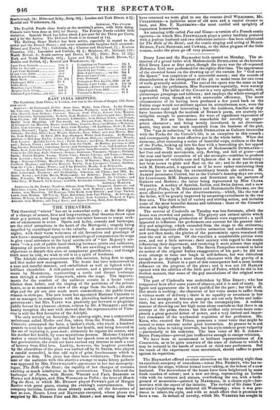THE THEATRES.
Tan theatrical " winter " has set in somewhat early : at the first signs of a change of season, fires and long evenings, four theatres throw open their gay portals, and bang out their red-letter banners to tempt seek- ers of amusement to enter. Opera and ballet, comedy and burlesque, are the chief attractions in the heart of the Metropolis ; tragedy being impelled by centrifugal force to the suburbs. A succession of opening- nights, with their warm welcomes of old favourites and greetings of new faces—managerial appeals and musterings of companies on the stage to give vocal utterance to the loyal sentiments of "her Majesty's ser- vants "—is a sort of public band-shaking between actors and audiences, disposing all parties to be pleased. We are unwilling to allow critical objections to disturb this state of complacent gratification ; and though truth must be told, we wish to tell it in a spirit of kindness.
The Adelphi claims precedence on this occasion, being first to open, and that under new management. The house has been redecorated in a neat and tasteful manner, and embellished as well as lighted with a brilliant chandelier. A rich painted curtain, and a picturesque drop- scene by MARSHALL, representing a castle and distant landscape seen through a circular framework, adorn the stage. The improve- ments for the comfort of the audience consist in a better venti- tilation than before, and the sloping of the partitions of the private boxes, so as to command a view of the stage from the back ; the side- slips and the pit are also made more commodious ; the public boxes remain in statu quo. The new lessee has appointed Madame CELESTE to act as manager, in compliance with the prevailing fashion of petticoat government ; but Mrs. YATES was prudently put forward to propitiate public favour in a pleasant address, written by Mr. ATECKETT ; and the hearty reception she met with showed that the representative of Victo- rine is still the first favourite of the Adelphi. The only novelty on Saturday, the opening-night, was a commercial melodrama called Mother and Son, taken from the French. Madame CELESTE personated the hero, a banker's clerk, who steals a hundred pounds to send his mother abroad for her health, and being detected in the act of replacing it, goes mad ; ultimately he regains his senses, and Ins mother her health, by some mysterious process. Madame CELESTE makes a smart-looking lad : but had her speech been as intelligible as her gesticulation, she could not have excited any interest in such a case of larceny from filial love. Luckily, however, the laughter proyoked by the absurdities of the piece was carried off by 0. SMITH, who played a candid scoundrel, in that odd style of grim facetiousness which is peculiar to him. The piece has since been withdrawn. The discon- tent of the audience with this abortive attempt to make felony pathetic was appeased by Mrs. FITZWILLIAM'S appearance in her last monopoly- logue, The Belle of the Hotel; the rapidity of her changes of costume exciting as much admiration as her personations. Then followed the burlesque of Norma, with Messrs. WRIGHT and PAUL BEDFORD as Norma and Adelgisa, and MISS WOOLGAR as Pollio ; the farce of How to Pay the Bent, in which Mr. Hanson played POWER's part of Morgan Rattler with great gusto, closing the evening's entertainments. The company includes, besides those already named, all the favourites of lest season, Messrs. LYON and MAYNARD excepted, whose places are stspplied by Mr. DIBDIN PITT and Mr. SELBY ; and among those who
have returned we were glad to see the veteran droll Wrurartsost, Mr. CULLENFORD—a judicious actor of old men and a capital dresser to boot, and Mrs. F. MerrnEws—the most cordial and sprightly of loquacious housewives. An amusing trifle called Fos and Goose—aversion of a French comic operetta—in which Mrs. FITZWILLIAM plays a pretty landlady pestered with a jealous husband and two ridiculous suitors—has been substituted for The Belle of the Hotel; and the comic singing and acting of Messrs. Hanson, PAUL BEDFORD, and COWELL, as the three plagues of the little woman, make the piece go off very pleasantly.


























 Previous page
Previous page